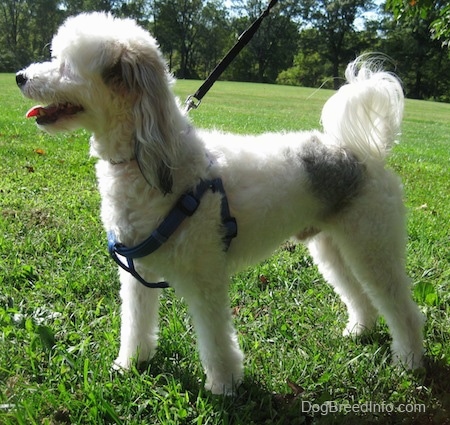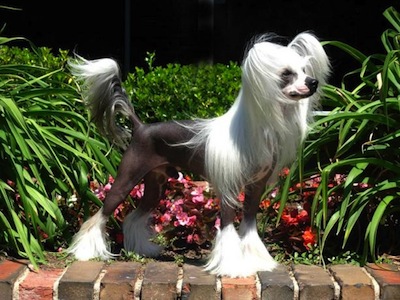General Discussion
Related: Editorials & Other Articles, Issue Forums, Alliance Forums, Region ForumsCanine Surprise: Dogs Arenít Descended From Todayís Wolves
http://www.businessinsider.com/canine-surprise-dogs-arent-descended-from-todays-wolves-2014-1
***SNIP
Complicated canines
The high-quality, full sequences allowed the researchers to look at genetic variations across the entire genome. That's important, Novembre told LiveScience, because previous work was limited to snippets of DNA, chosen because they were known to vary from dog breed to dog breed. [The Coolest Animal Genomes]
"When we apply these to looking at dogs and wolves, we don't get a complete picture, because we can't see the variations that existed in wolves but vanished in dogs," Novembre said.
The new results, published today (Jan. 16) in the journal PLOS Genetics, reveal that dogs do not hail from the same lineage as modern wolves — a big surprise, said Novembre, who was hoping to see evidence for either a single domestication or multiple domestication events, where, for example, the Australian dingo would be most related to the Asian wolf and the African basenji would be most related to the Middle Eastern wolf.
Instead, the dogs are all most closely related to each other. The pattern suggests that dogs arose from a now-extinct line of wolves, Novembre said. Later, early in domesticated doggie history, they interbred with still-wild wolves, causing a genetic snarl that frustrates dog genetics researchers to this day.
Read more: http://www.livescience.com/42649-dogs-closest-wolf-ancestors-extinct.html#ixzz2ql2pLZoI
starroute
(12,977 posts)I don't seem to have saved the story, so I can't offer a link. But it pointed out that wolves are not suitable for domestication because they have a strong dominance hierarchy, and even when wolf-pups are raised by humans, they are likely to start challenging their owners for dominance once they mature.
Dogs aren't like that, and the story went on to suggest that dogs may be descended from a variety of wolf that was naturally less competitive. I believe it also concluded that all the members of this hypothetical species of more laid-back wolves might have taken to hanging out with humans, which is why there are none left in the wild today. In other words, the ancestors of dogs were already dogs, just waiting around for us to show up and make friends.
It was a fascinating concept, and I wish I could find the story again.
starroute
(12,977 posts)Naish is my favorite paleontologist, and he always has interesting ideas on almost any subject. This blog entry from 2006 runs through the problems with seeing dogs as domesticated wolves and it's probably where I originally encountered the idea. Basically, he concludes that the wild ancestors of dogs were not wolf-like but already dingo-like and that this made them inclined to hang around human campsites in a way that wolves would never have done.
http://darrennaish.blogspot.com/2006/10/controversial-origins-of-domestic-dog.html
All of this begs the question: if domestic dogs aren’t wolves, what are they? The answer seems to be that Canis familiaris is a distinct species with its own independent history. Prior to domestication, it presumably existed as a relatively small, generalized canid that voluntarily adopted the commensal pariah niche still occupied by many dog populations today. This is supported by the morphological and molecular distinctiveness of domestic dogs, by the anatomy and behaviour of primitive domestic dog breeds, and by the archaeological and fossil record.
If this is true then the truly wild ancestors of modern domestic dogs are extinct. True, there are wild pariah-type dogs in various places around the world (there are wild populations of New Guinea singing dogs and dingos, for example), but they’ve been introduced by people. However, the lack of the original wild form in a species that has become domesticated or at least semi-domesticated is not unprecedented nor unusual: Dromedaries Camelus dromedarius, for example, only exist in the wild today in feral form, and are otherwise entirely domesticated, and the wild ancestors of modern domestic horses and cattle are entirely extinct. In fact the eradication of the wild ancestors of a domestic form is thought by some to one of the key historical events that occurs during the domestication process (Dobney & Larson 2006).
The theory that domestic dogs descend, not from wolves, but from a wild Canis familiaris remains unpopular and overlooked, and even today relatively few zoologists are aware of the literature on this ‘alternative’ view of domestic dog origins. As mentioned earlier, my primary inspiration in this area has been Janice Koler-Matznick and her papers, and I have only scratched the surface in terms of the information she has provided.
JaneyVee
(19,877 posts)To adapt to their new environment of human domestication.
ChiciB1
(15,435 posts)However, I can't even remember HOW LONG I've wanted an answer to this question! I'm not even sure this article does it for me either. As one who prefers larger dogs, and have 2 Chocolate Labs right now, this subject has fascinated me. I've bought many books hoping to get a definitive explanation, but nothing yet.
But do tell, how do you get all the little tiny dogs we see today. I understand breeding as time has passed, but from wolves way down... I wonder if the real answer will ever be known.
One of the cutest dogs I've ever seen were miniature rottweilers! Kind of jaw dropping, but I can understand how THIS could happen. But from the many German Shepherds I've owned and other larger dogs it's hard to figure how the tea cup poodles were bred.
Baclava
(12,047 posts)Study Reveals Why Some Dogs Are So Small
From the Chihuahua that’s tiny enough to fit in a purse, to the most massive mastiff, dogs have an incredible, and scientifically baffling, range in size.
“Dogs have the biggest range of sizes of any mammal in existence,” said biologist K. Gordon Lark of the University of Utah. “One of the big questions has always been where does this range of sizes come from?”
Lark and his colleagues think they’ve found part of the answer to this question: a piece of doggy DNA that regulates growth to keep small dogs small.
DNA search
To find the genetic clues to dog size, the researchers enlisted the help of hundreds of Portuguese water dog owners to get DNA samples and body-size measurements of their pooches.
This breed of dogs has a remarkable three-fold range in size, from 25 to 75 pounds. By analyzing the dogs’ DNA, the researchers found the piece of their genetic material that strongly correlated with their size.
The DNA snippet isn’t actually a gene—it’s called a regulatory sequence. This sequence is next to a gene that regulates a growth-inducing protein hormone that helps humans and other mammals grow from birth to adolescence.
In small dogs, one or more mutations in the regulatory sequence suppress the gene’s activity, so it won’t produce as much of the hormone, Lark said, effectively preventing any Labrador-sized Chihuahuas.
Medium and large dogs are missing this regulatory sequence, said study team member Kevin Chase, also of the University of Utah. So Great Danes can grow to their normal, intimidating size. Other genetic material that has yet to be identified also likely contribute to the size of these dogs, he added.
To confirm their findings, detailed in the April 6 issue of the journal Science, the researchers examined 3,241 other dogs from 143 different breeds, including Chihuahuas, pugs, toy poodles, Saint Bernards, Irish wolfhounds and standard poodles.
In all of the small breeds, the same regulatory sequence was found.
“All dogs under 20 pounds have this—all of them,” Lark said. “That’s extraordinary.”
Oddly, Rottweilers also have the sequence, but other genetic factors likely make them big, Chase said.
http://www.livescience.com/7268-study-reveals-dogs-small.html
ChiciB1
(15,435 posts)I know the reply is late, but did want to acknowledge that I received your reply. As you know, so many issues are flying all over the place & I'm finding it hard to keep up. I do have several books that have given me some insight to a lot of opinions regarding canines. The DNA info makes sense, but I've had to realize that since I'm simply a dog lover/owner and not a student, I don't think I've delved as deeply as many others.
While it's not as intense as human evolution and the theories regarding the subject, I suppose questions will always remain. I don't question evolution in any way, I can't say I "know" for sure how we as humans evolved.
But I do know I have a deep love for animals that has never wavered.
![]()
Baclava
(12,047 posts)Chinese crested - furry

and hairless

XemaSab
(60,212 posts)The prediction would be that crossing them would result in a wolfish dog no?
But you interbreed most dogs and you get a generic yellow dog that looks like a dingo and nothing like a wolf.
tabasco
(22,974 posts)They are full of love; much moreso than the "intelligent" apes who domesticated them.
uriel1972
(4,261 posts)would require the cunning little so and so's develop time travel. Apart from that, there's a lot of time between domestication and today so the history would be a little muddled. Scientific techniques improve with time and our understanding grows.
Larsonb
(40 posts)We have common ancestors, just as dogs and wolves do.
Arugula Latte
(50,566 posts)Welcome to DU!
Orsino
(37,428 posts)It doesn't surprise me that the ancestral species was out-competed by dogs, who are just amazing in the ways they adapt to our lifestyles.